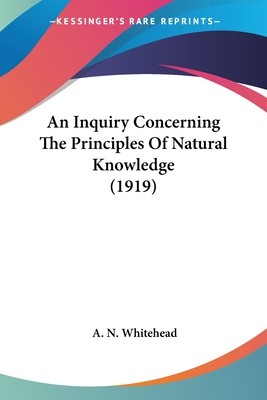
- We will send in 10–14 business days.
- Author: A N Whitehead
- Publisher: Kessinger Publishing
- ISBN-10: 0548760993
- ISBN-13: 9780548760994
- Format: 15.2 x 22.9 x 1.2 cm, softcover
- Language: English
- SAVE -10% with code: EXTRA
An Inquiry Concerning The Principles Of Natural Knowledge (1919) (e-book) (used book) | bookbook.eu
Reviews
Description
This historic book may have numerous typos and missing text. Purchasers can usually download a free scanned copy of the original book (without typos) from the publisher. Not indexed. Not illustrated. 1919 edition. Excerpt: ... PART I THE TRADITIONS OF SCIENCE CHAPTER I MEANING 1. Traditional Scientific Concepts. 1-1 What is a physical explanation? The answer to this question, even when merely implicit in the scientific imagination, must profoundly affect the development of every science, and in an especial degree that of speculative physics. During the modern period the orthodox answer has invariably been couched in terms of Time (flowing equably in measurable lapses) and of Space (timeless, void of activity, euclidean), and of Material in space (such as matter, ether, or electricity). The governing principle underlying this scheme is that extension, namely extension in time or extension in space, expresses disconnection. This principle issues in the assumptions that causal action between entities separated in time or in space is impossible and that extension in space and unity of being are inconsistent. Thus the extended material (on DEGREEShis view) is essentially a multiplicity of entities which, as extended, are diverse and disconnected. This governing principle has to be limited in respect to extension in time. The same material exists at different times. This concession introduces the many perplexities centering round the notion of change which is derived from the comparison of various states of self-identical material at different times. 1-2 The ultimate fact embracing all nature is (in this traditional point of view) a distribution of material throughout all space at a durationless instant of time, and another such ultimate fact will be another distribution of the same material throughout the same space at another durationless instant of time. The difficulties of this extreme statement are evident and were pointed out even in classical times when the con
EXTRA 10 % discount with code: EXTRA
The promotion ends in 20d.20:05:53
The discount code is valid when purchasing from 10 €. Discounts do not stack.
- Author: A N Whitehead
- Publisher: Kessinger Publishing
- ISBN-10: 0548760993
- ISBN-13: 9780548760994
- Format: 15.2 x 22.9 x 1.2 cm, softcover
- Language: English English
This historic book may have numerous typos and missing text. Purchasers can usually download a free scanned copy of the original book (without typos) from the publisher. Not indexed. Not illustrated. 1919 edition. Excerpt: ... PART I THE TRADITIONS OF SCIENCE CHAPTER I MEANING 1. Traditional Scientific Concepts. 1-1 What is a physical explanation? The answer to this question, even when merely implicit in the scientific imagination, must profoundly affect the development of every science, and in an especial degree that of speculative physics. During the modern period the orthodox answer has invariably been couched in terms of Time (flowing equably in measurable lapses) and of Space (timeless, void of activity, euclidean), and of Material in space (such as matter, ether, or electricity). The governing principle underlying this scheme is that extension, namely extension in time or extension in space, expresses disconnection. This principle issues in the assumptions that causal action between entities separated in time or in space is impossible and that extension in space and unity of being are inconsistent. Thus the extended material (on DEGREEShis view) is essentially a multiplicity of entities which, as extended, are diverse and disconnected. This governing principle has to be limited in respect to extension in time. The same material exists at different times. This concession introduces the many perplexities centering round the notion of change which is derived from the comparison of various states of self-identical material at different times. 1-2 The ultimate fact embracing all nature is (in this traditional point of view) a distribution of material throughout all space at a durationless instant of time, and another such ultimate fact will be another distribution of the same material throughout the same space at another durationless instant of time. The difficulties of this extreme statement are evident and were pointed out even in classical times when the con


Reviews